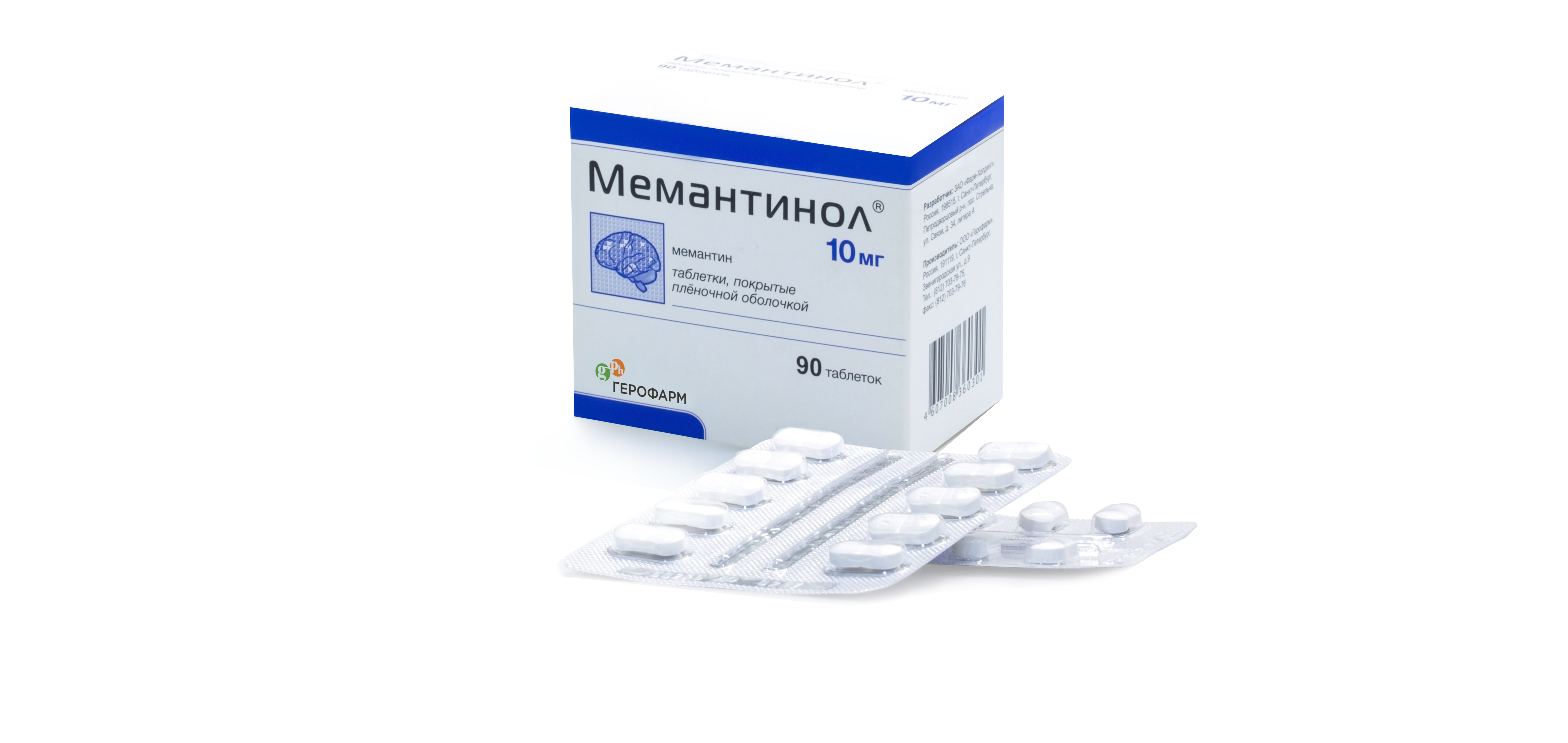Memantinol® (INN memantine) is a novel agent that belongs to the memantine group to treat moderate and severe dementia of the Alzheimer's type. The agent is made of high-quality Italian substance. All production stages (from molecular synthesis to blistering and packing) are controlled by the quality department of GEROPHARM following GMP standards. At the final stage, the product goes through the equipment which is supplied with a unique tablet press machine.
A tablet of Memantinol® contains 10 mg of active substance (Memantine HCl). It is a white, oval oblong, film-coated tablet with breaking line and debossed with 'g' on one side and 'ph' on the other side.
A tablet of Memantinol® can’t be confused with any other tablet because of its unique shape. It can be easily divided. Its counterfeiting is almost impossible.
Memantinol® is an optimal choice for basic therapy of dementia. Supportive care can be indefinitely long-term if the conducted therapy provides a positive effect and in case of good treatment tolerability.
This drug is a prescribed medicine. It can be dispensed on a doctor's prescription only. There are contraindications. Please read the patient information leaflet. Do not use the medicinal agent if it was not prescribed by your treating physician. Always follow the patient information leaflet and your doctor’s recommendations.
Pharmacodynamics
Memantin is a voltage-dependent NMDA receptor antagonist, with moderate binding affinity. It blocks the effects of excessive levels of glutamate that may lead to neuronal dysfunction.
INN: memantin.
Dosage form: film-coated tablets. 1 tablet contains: memantine hydrochloride, 10 mg.
Pharmacotherapeutic group: anti-dementia drug.
Pharmacodynamics: memantin is a voltage-dependent NMDA receptor antagonist, with moderate binding affinity. It blocks the effects of excessive levels of glutamate that may lead to neuronal dysfunction.
It is indicated for treatment of the following: moderate and severe dementia of the Alzheimer's type.
Contraindicationsare as follows: known hypersensitivity to memantine or to any excipients used in the formulation; pregnancy and breastfeeding; less than 18 years of age, galactose intolerance, lactase deficiency or glucose-galactose malabsorption.
Directions for use and dosage: the agent must be taken once a day, at the same time, with or without food. Adults: titration. Maximum daily dose is 20 mg per day. To reduce the risk for adverse reactions, increase the dose by 5 mg/week over a 3-week period. Starting from week 4, the patient is given 20 mg per day (two 10 mg tablets). Maintenance Dose is 20 mg per day.
Adverse effects: in clinical studies of patients with moderate and severe dementia, the total rate of adverse effects when taking memantin was equivalent to that for placebo. Very rare: paroxysms. Uncommon: fungal infections, confusion, hallucinations (in patients with Alzheimer’s disease at the stage of severe dementia), gait disorder, venous thrombosis/thromboembolia, nausea, vomiting, fatigue; common: hypersensitivity to drug components, somnolence, dizziness, balance disorder, increased arterial pressure, dyspnea, constipation, elevated liver enzymes, headache; frequency is not established – Psychotic reactions (postmarketing experience), pancreatitis, hepatitis.
Dosage form: film-coated tablets, 10 mg.
Shelf-life: 2 years.
Storage conditions:
Store below 25 °C
Dispensing conditions: by prescription.
Company that accepts claims from the customers:
GEROPHARM
Business center "Nevskaya Ratusha" 11B, Degtyarny lane, St. Petersburg, 191144, Russian Federation
Phone: +7 (812) 703-79-75 , Fax: +7 (812) 703-79-76
Toll-free number: 8-800-333-4376 (free call across the Russian Federation)
Reg. number: ЛП-002450.
Please read the patient information leaflet for detailed information on the drug.
Currently, there are 20, 30 and 90 tablets per pack.
Tablets of Memantinol® by GEROPHARM are white, oval oblong, film-coated tablet with breaking line and debossed with 'g' on one side and 'ph' on the other side.
It is easy to:
- recognize the tablet;
- divide it;
- titrate a dose;
- memorize the form.
It is difficult to:
- confuse it;
- forget it.

